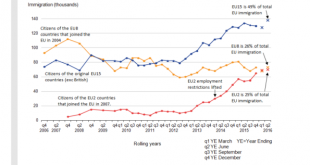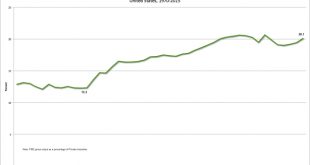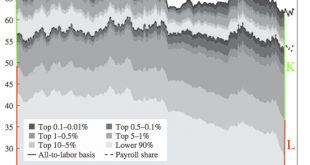Read More »
Trade, Trump, and the economy: What does Greg Mankiw’s textbook say?
from Dean Baker Harvard professor, textbook author, and occasionally New York Times columnist Greg Mankiw told readers today that Donald Trump’s economic team is wrong to worry about the trade deficit. “The most important lesson about trade deficits is that they have a flip side. When the United States buys goods and services from other nations, the money Americans send abroad generally comes back in one way or another. One possibility is that foreigners use it to buy things we produce,...
Read More »Labour links
Brexit, TrumpKKK, the EU – broadly defined labour markets are key. About this: A. Noah Smith is changing his opinion A job is more than a paycheck. It is a social institution, too Debunking labour economics 101 (very clever but also logical and empirical) B. Frances Coppola is not changing her opinion: ‘Reinventing work for the future'(about basic income) C. The Daily Mail wants to change your opinion, about this (graph) Source: ONS. The non-far right should not leave it to the Daily Mail...
Read More »Class before Trumponomics, part 3 (8 graphics)
from David Ruccio In the second installment of this series on “class before Trumponomics,” I argued that, in recent decades, while American workers have created enormous wealth, most of the increase in that wealth has been captured by their employers and a tiny group at the top—as workers have been forced to compete with one another for new kinds of jobs, with fewer protections, at lower wages, and with less security than they once expected. And the period of recovery from the Second...
Read More »Stephen Hawking: “we are at the most dangerous moment in the development of humanity”
from The Guardian “the world’s leaders need to acknowledge that they have failed and are failing the many” . . . the recent apparent rejection of the elites in both America and Britain is surely aimed at me, as much as anyone. Whatever we might think about the decision by the British electorate to reject membership of the European Union and by the American public to embrace Donald Trump as their next president, there is no doubt in the minds of commentators that this was a cry of anger...
Read More »The slow, painful death of the TPP
from Dean Baker In spite of the hopes of many elite types for a last-minute resurrection, it appears that the Trans-Pacific Partnership (TPP) is finally dead. This is good news, but it took a long time to kill the deal, and the country is likely to pay a huge price for the execution. The basic point that everyone should know by now is that the TPP had little to do with trade. The United States already had trade deals with six of the 11 other countries in the pact. The trade barriers with...
Read More »Pay to model
from David Ruccio Back in 2010, Charles Ferguson, the director of Inside Job, exposed the failure of prominent mainstream economists who wrote about and spoke on matters of economic policy to disclose their conflicts of interest in the lead-up to the crash of 2007-08. Reuters followed up by publishing a special report on the lack of a clear standard of disclosure for economists and other academics who testified before the Senate Banking Committee and the House Financial Services Committee...
Read More »Link for today (and tomorrow). How the Koch’s hijacked the Trump ticket
From George Monbiot in The Guardian: Yes, Donald Trump’s politics are incoherent. But those who surround him know just what they want, and his lack of clarity enhances their power. To understand what is coming, we need to understand who they are. I know all too well, because I have spent the past 15 years fighting them. The failure to get to grips with our crises, by all mainstream political parties, is likely to lead to a war between the major powers in my lifetime Over this time,...
Read More »Let’s take (un)employment statistics more serious
On his insightful ‘conversable economist’ blog the excellent Timothy Taylor has a good piece about European unemployment which as follows: American readers: can you imagine the social turmoil in the US if the unemployment rate has been above 10% for the last seven years, instead of peaking at 10% back in October 2009 and falling down to about 5% by a year ago in fall 2015? Can you imagine if half of these unemployed had been looking for work for more than a year? Consider the difference,...
Read More »Class before Trumponomics, part 2 (10 graphics)
from David Ruccio In the first installment of this series on “class before Trumponomics,” I argued that the recovery from the crash of 2007-08 created conditions that were favorable to capital at the expense of labor—and that trend represented a continuation of the class dynamic that had characterized the U.S. economy for decades, going back at least to the early 1980s. There are, of course, many details that were left out of that story, and I want to present a more fine-grained class...
Read More » Real-World Economics Review
Real-World Economics Review







